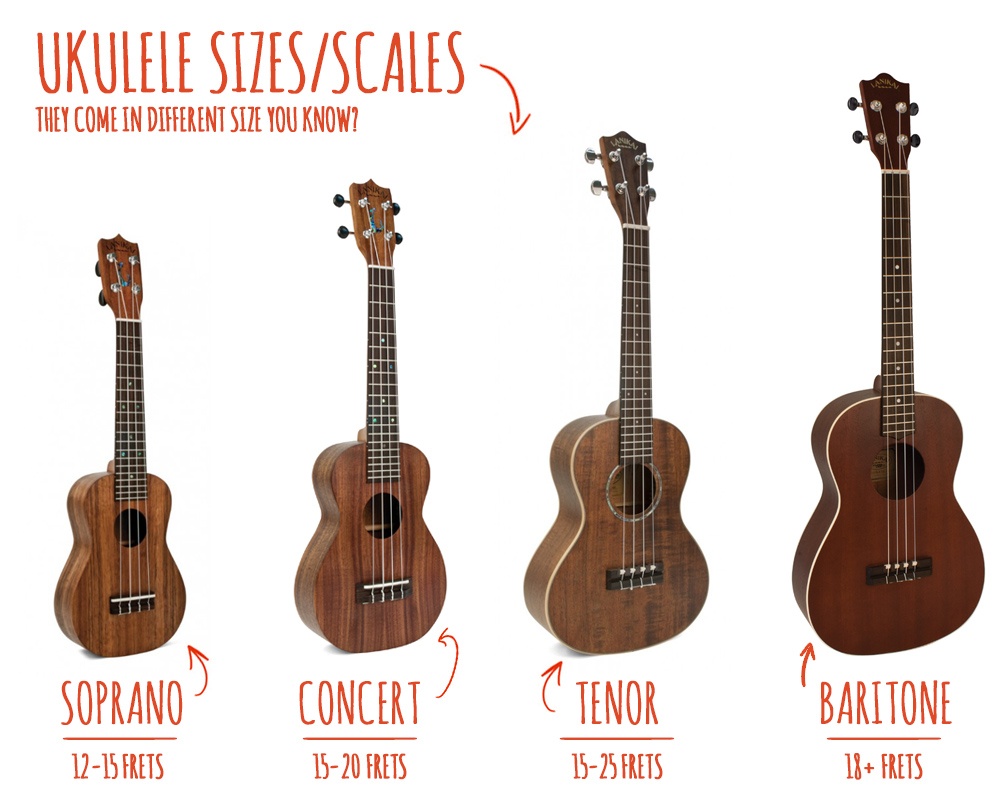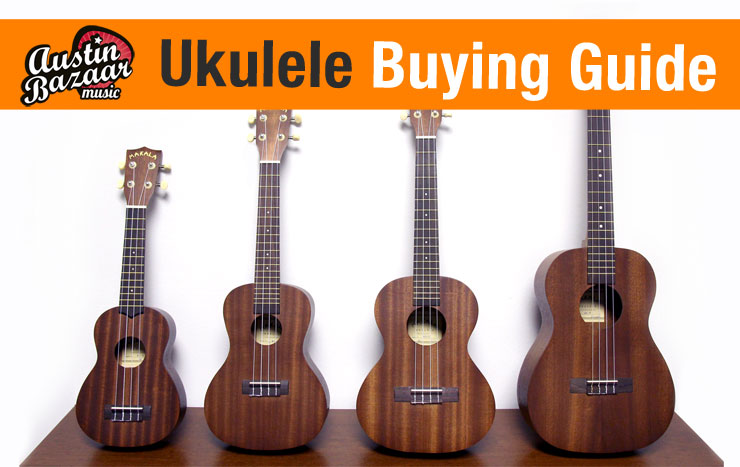The tenor ukulele is larger than the concert ukulele, offering deeper tone and more volume. It typically has a longer scale length and more frets.
Ukuleles come in several sizes, each with its characteristic sound and playability. The tenor, with its extended scale of around 17 inches, allows players a wider range and a fuller sound profile, making it a favorite among performers. Its concert counterpart usually measures about 15 inches in scale, providing a sweet, bright tone that beginners and intermediate players frequently favor.
This manageable size blends portability with a richer sound than the smaller soprano ukulele. Choosing between a tenor and a concert ukulele involves considering one’s hand size, musical preferences, and the desired tonal qualities, enriching the playing experience for ukulele enthusiasts of all levels.

Credit: blog.deeringbanjos.com
History Of The Ukulele
The enchanting strum of the ukulele often brings to mind gentle waves and island melodies. The history of the ukulele is as rich and varied as the sounds it produces. This beloved instrument has traveled far from its roots to become a global favorite.
Origins And Hawaian Influence
The ukulele’s journey began in the 19th century. Portuguese immigrants, particularly from Madeira and the Azores, brought with them a small guitar-like instrument called the ‘machete’. The islanders of Hawaii were captivated by its melodious harmony and adopted it into their culture, renaming it ‘ukulele’ which roughly translates to ‘jumping flea’. This name reflects the lively movement of the fingers when strumming.
Queen Liliʻuokalani of Hawaii felt the ukulele represented the nation’s spirit. The instrument’s popularity soared as it became entwined with Hawaiian music and royalty. Hawaiian musicians and entertainers helped spread its charm as they toured the United States and Europe.
Evolution Of Ukulele Sizes
Size, tone, and volume distinguish different ukulele types. From the smallest to the largest, the primary types are soprano, concert, tenor, and baritone.
- Soprano: the original size, known for its bright, jangly sound ideal for traditional Hawaiian music.
- Concert: slightly larger, offering a richer sound and more room between frets.
| Tenor | A favorite for its deeper tone and larger body, which allows for a more varied range of notes. |
|---|---|
| Baritone | Closest to a guitar with a deep, full sound, appealing to those transitioning from the guitar. |
As music evolved, the need for varied tones and volumes led to these size variations in ukuleles. Each size offers unique benefits, ensuring there’s a perfect ukulele for every type of player.
The Tenor Ukulele Explored
Embark on a musical journey with the tenor ukulele. Delve into its unique features and understand why it stands out in the ukulele family. This exploration sheds light on its physical attributes and sound. Get ready to discover the essence of the tenor ukulele.
Physical Characteristics
The tenor ukulele boasts a distinctive size and structure. Check out its key physical aspects:
- Larger Frame: Stands out with its lengthy body, providing ample space for finger placement.
- Scale Length: The vibrating string space stretches further, typically around 17 inches.
- Number of Frets: Offers more frets, usually between 17 to 19, for wider musical reach.
- Standard Tuning: Like its cousins, tuned G-C-E-A but with a looser feel due to size.
Sound And Playability
The tenor ukulele is renowned for its rich, full-bodied sound. Its larger size contributes to its sonorous qualities. Here’s how:
| Aspect | Contribution to Sound |
|---|---|
| Volume and Tone | Projects louder, clearer sound with balanced tones. |
| Lower Range | Delivers deeper notes compared to smaller ukes. |
The tenor’s playability makes it a favorite for both beginners and seasoned players:
- Finger-friendly fret spacing eases chord transitions.
- Ample room on the fretboard aids intricate fingerpicking.
- Larger body accommodates diverse playing styles smoothly.
Delving Into The Concert Ukulele
Welcome to our musical journey as we explore the wonders of the concert ukulele. This charming stringed instrument captivates players and audiences alike. Understanding its unique characteristics is key to mastering its potential. Let’s delve into what makes the concert ukulele a distinct and beloved member of the ukulele family.
Design Features
The concert ukulele stands out with its size and structure.
- Bigger body than the tenor offers more space for sound to resonate.
- Typically 23 inches in length, it balances size and comfort.
- Standard four strings tuned to G-C-E-A provide a warm sound.
- Wider fret spacing accommodates fingerpicking and complex chords.
Tonal Qualities And Performance
The concert ukulele is known for its rich and mellow tones.
- Deeper sound due to larger body compared to the soprano.
- A versatile instrument suitable for multiple music styles.
- Provides a full sound that supports singing with clarity.
- Ideal for both solo performances and group settings.
Embrace the concert ukulele for its distinctive blend of size, playability, and musical versatility.

Credit: www.austinbazaar.com
Comparing Tenor And Concert Ukuleles
Ukulele enthusiasts often ponder over choosing between a tenor and a concert ukulele.
Their differences span size, sound, and playability, influencing a player’s musical journey.
Let’s delve deeper into what sets these two popular ukulele sizes apart.
Size And Scale Length
The tenor ukulele typically measures around 26 inches in total length.
Its scale length extends about 17 inches.
The concert ukulele stands smaller, at roughly 23 inches, with a scale length near 15 inches.
This size difference affects tone and volume.
| Type | Total Length | Scale Length |
|---|---|---|
| Tenor Uke | 26 inches | 17 inches |
| Concert Uke | 23 inches | 15 inches |
Tuning Variations
Both ukulele types often use G-C-E-A tuning.
Yet, the tenor can be tuned to a lower G for a richer sound.
This variance introduces a broader sonic range.
- Concert Ukulele – Standard G-C-E-A.
- Tenor Ukulele – Lower G optional.
Suitability For Different Players
The concert ukulele’s compact size suits beginners and those with smaller hands.
Its comfortable fret spacing eases learning.
The tenor’s larger size and wider frets better accommodate experienced players.
It is ideal for those seeking a richer sound and more volume.
- Concert Uke – Best for new players and small hands.
- Tenor Uke – Suited for advanced players seeking depth.
Making The Right Choice
Making the Right Choice between a tenor and concert ukulele can be a delightful challenge. The decision hinges on personal preference, playability, and the sound each ukulele produces. Whether you’re a beginner or a seasoned musician, understanding the difference between these two types of ukuleles is crucial. It’s essential to consider size, tone, volume, and portability to make an informed choice that complements your musical journey.
Considerations For Beginners
- Size Matters: A concert ukulele is slightly larger than a soprano but smaller than a tenor, making it a comfortable middle ground for new players.
- Playability: With more space between frets, concert ukuleles offer beginners an easier learning curve.
- Sound Preferences: If a richer, fuller sound is desired, a tenor may be more suitable, even for starters.
- Portability: Consider how easy it is to carry your instrument. Concert ukuleles are generally more portable than tenors.
Pros And Cons For Experienced Musicians
| Tenor Ukulele | Concert Ukulele | |
|---|---|---|
| Tone Quality | Offers a richer, deeper tone. | Produces a bright, classic ukulele sound. |
| Volume and Projection | Louder with more resonance. | Less volume but maintains a balanced projection. |
| Fretboard Space | Wider spacing is ideal for complex fingerwork. | More compact spacing can limit some techniques. |
| Transportability | Less portable due to a larger size. | More portable, suitable for travel and gigs. |
Choosing the right ukulele will elevate your musical experience. For beginners, a concert ukulele might be the best starting point. Experienced musicians should weigh the pros and cons, focusing on their preferred tonal quality and playability. Whether you choose a tenor or concert ukulele, let your passion for music guide you.
Popular Models And Brands
Choosing the right ukulele is key to your musical journey. The tenor and concert ukuleles both offer unique sounds. Their designs come from reputable brands. Each brand offers models that cater to a range of skills and preferences. Let’s dive into the popular models worth considering.
Top Tenor Ukes On The Market
Tenor ukuleles have a rich tone and larger size. They are great for performers. Many professionals trust these top models:
- Kala KA-T Mahogany Tenor – Known for its warm sound and easy playability.
- Lanikai LU-21T Tenor – Offers a classic design with modern sound quality.
- Fender Montecito Tenor – Fender brings a sleek look with its trademark headstock.
- Martin T1K Koa Tenor – Martin’s premium Koa wood model exudes quality.
- Cordoba 20TM-CE – A cutaway design with electronics for perfect amplification.
These brands stand out for their craft and sound. They suit a variety of musical styles.
Concert Ukes Worth Considering
Concert ukuleles blend portability with a full-bodied sound. Ideal for players of all levels. Here are noteworthy models:
- Kala KA-CG Concert – A glossy finish and full tone make this a favorite.
- Yamaha GL1 Guitalele – Half guitar, half ukulele, it’s unique and versatile.
- Oscar Schmidt OU5 – Beautiful Hawaiian Koa body with superb sound.
- Lanikai FM-C – Offers flamed maple body for a bright, punchy tone.
- Flight TUS35 – Travel-friendly with an impressive range of colors.
These concert ukes are loved for their rich and lively music. They fit various genres and playstyles.
Frequently Asked Questions On What Is The Difference Between Tenor And Concert Ukulele
Which Is Better Tenor Or Concert Ukulele?
The better choice between a tenor or concert ukulele depends on personal preference. Tenor ukuleles offer a richer, deeper sound, while concert ukuleles are preferred for their comfortable size and brighter tone.
Is A Tenor Ukulele Good For A Beginner?
Yes, a tenor ukulele is suitable for beginners due to its comfortable size, pleasant sound, and versatility for various music styles.
Which Type Of Ukulele Is Best For Beginners?
The soprano ukulele is the best choice for beginners due to its smaller size, affordable price, and user-friendly fret spacing.
Is A Tenor Ukulele Tuned The Same As A Concert Ukulele?
Yes, a tenor ukulele is tuned the same as a concert ukulele, typically to G-C-E-A. Both offer the same pitch but differ in body size and tone.
Conclusion
Navigating the nuances between tenor and concert ukuleles is key for any ukulele enthusiast. The tenor’s deeper tones suit solo performances, while the concert’s bright sound is perfect for strumming along with friends. Your choice depends on personal preference and playing style.
Embrace the differences and let your music flourish!
